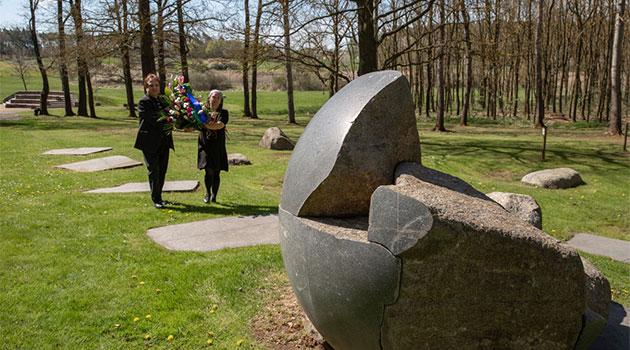Czech Museum of Romani Culture commemorates Holocaust victims in online ceremony

Yesterday the Museum of Romani Culture in the Czech Republic held an online commemorative ceremony honoring the memories of the victims of the Holocaust who were imprisoned in what was referred to at the time as a “Zigeunerlager” in Lety u Písku; due to the COVID-19 pandemic the traditional commemorative ceremony, which is usually attended by 100 or more people paying their respects, could not be held directly at the site of the former camp. At 8 AM the museum sent out a video greeting from Čeněk Růžička, a longtime organizer of the commemorative ceremonies at Lety, in his role as the chair of the Committee for the Redress of the Roma Holocaust in the Czech Republic.
At 9 AM a photo gallery was published online of the employees of the Museum of Romani Culture enacting a small-scale ceremony at the Lety u Písku Memorial to the Holocaust of the Roma and Sinti in Bohemia.
At 10 AM a new video thematizing the events at both former “Zigeunerlager” in the wartime Protectorate of Bohemia and Moravia, the camp at Hodonín u Kunštátu and the one at Lety, was broadcast online by the museum.
The ceremony was held on the occastion of the 78th anniversary of a large transport of more than 400 children, men and women imprisoned at the Lety camp to an all but certain death in the concentration and extermination camp of Auschwitz II-Birkenau. Romani people from the Protectorate were the second most-numerous group of Romani people in such transports of Roma from all over Europe, after the Sinti and Romani prisoners from the German Reich proper.
More than 22 000 Romani children, men and women total passed through Auschwitz and almost 20 000 of them did not survive their imprisonment. After the liberation of occupied Czechoslovakia, of the indigenous Roma from Bohemia and Moravia who had been deported to the concentration camps and other internment or forced labor facilities, just 600 Romani children, men and women returned to the Czech lands.
The murder of the Bohemian and Moravian Roma was likely to have been one of the most thoroughly-performed genocides of the Second World War. As many as half a million Romani people total are estimated to have fallen victim to Nazism in Europe.
